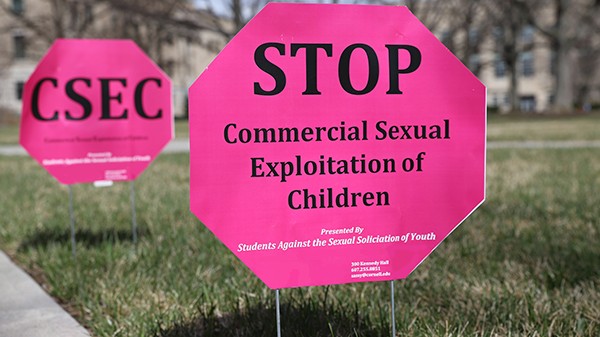Students, county agency raise awareness of commercial sexual exploitation of children
In 2020, nearly 17,000 people were reported victims of commercial sexual exploitation and human trafficking in the United States, though experts estimate the number would be higher if more people knew what to look for. Commercial sexual exploitation of children (CSEC) can be even harder to identify, as it so often involves exploitation by an adult who knows the child.
A collaboration between the Tompkins County CSEC Critical Team and Students Against the Sexual Solicitation of Youth (SASSY), a student-run program of the David M. Einhorn Center for Community Engagement, targeted the local lodging industry for outreach efforts to raise awareness about CSEC and trafficking.
Bridgette Nugent, deputy director of Tompkins County Youth Services (TCYS) and the county’s Safe Harbour coordinator of the CSEC Critical Team, explained that local CSEC often takes the form of an adult exploiting a homeless youth in exchange for food or housing, or family members selling sexual access to their children. Most local victims of CSEC are U.S. citizens.
“Some of the red flags to look out for are homelessness or chronic running away, the presence of an older boyfriend or girlfriend, a youth who suddenly has a new phone, new clothing or jewelry — things they wouldn’t normally have access to,” Nugent said. “It can also present as a controlling relationship with indications of physical abuse.”
The CSEC Critical Team, a collaboration of TCYS, the Advocacy Center and other youth-serving organizations in the county had identified the lodging industry as a target for outreach years ago but lacked the staffing resources to go door-to-door. Nugent reached out to SASSY after conducting a CSEC training with the group.
“Not only were they interested, but they really took the lead in terms of coordinating how they would go out and share the information. It felt like a perfect match, because they’re already so well-informed on the topic, and they provided valuable cultural sensitivity feedback on the information packets, which we modified before sending out.”
In November, students from SASSY visited over 20 area hotels and motels, delivering educational materials and speaking with staff. The response from the lodging industry was so positive that the Chamber of Commerce reached out to Nugent to discuss future trainings on the topic.
Centering the work of community organizations is an essential part of Einhorn Center programs.
“It’s a reciprocal relationship,” said Joyce Muchan, assistant director of student programs, SASSY advisor and a member of the Southern Tier Human Trafficking Task Force, “and we learn from the community. SASSY students accumulate a vast amount of knowledge on commercial sexual exploitation and work to bring visibility of the issues to their peers while engaging in community outreach projects.”
SASSY board president, Joanna Moon ’23, a biological sciences and science and technology studies double major in the College of Arts and Sciences, said the program has instilled in her the importance of listening to the community and holding herself accountable for continuous education about the issue.
“Regardless of the career you choose to go into, having an educational foundation in social justice gives you the ability to use your career towards addressing issues you’re passionate about down the road,” said Moon, who is planning to go into medicine and hopes to continue her advocacy in the healthcare sector.
SASSY started in 2006 after an Alternative Breaks trip to Girls Educational and Mentoring Services (GEMS), the nation’s leading organization for empowering commercially sexually exploited and trafficked girls and young women. SASSY continues to work to support GEMS and their mission.
For more information or to seek assistance and support, visit www.listenforthesigns.org or contact the Advocacy Center’s 24/7 confidential hotline at 607-277-5000 or the National Human Trafficking Hotline at 1-888-373-7888.


